On a Dividing Line in July of this year, Dr. James White discussed a section from a book by Dr. Matthew Barrett on the dangers of what he has termed “Biblicism”. The section was taken from Dr. Barrett’s forthcoming Systematic Theology. However, this post is not an interaction with the fuller points of that section but rather on what Dr. Barrett has tracked down to be the origin of the term “Biblicism”.
From the following screenshot of the section, we can see that Dr. Barrett has informed us that “The earliest use of the word ‘biblicism’ in English occurred in 1827 in a work by Sophei Finngan in criticism of ‘biblicism.'”

I was unaware of who Sophei Finngan was. As it turns out, Finngan was a Roman Catholic Priest. The title of his book in 1827 was “The Mania of Seduction Unmasked; or, A Scriptural View of the Rise, Progress and Decline of Biblicism: With Much Interesting Collateral Matter.” (The book can be read for free on Google Books.) As you can see below, Finngan offers a brief definition of Biblicism. The criticism of Biblicism in this initial definition is that of “a factious scheme, by cunning caught and spread”.
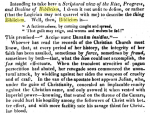
Noting that Finngan was a Catholic, it would certainly do us good to determine what he would have found so disturbing with what he called “Biblicism” that he would liken it to a contagion “caught and spread”.
Let us dive into what he meant and the implications involved with Dr. Barrett’s usage of Finngan. We see below that on pages 6-7 he wrote about the “angel of light” who were “clanging the clang of the war-whoop” with the end to “regenerate [Catholics] in Bible-laver”.
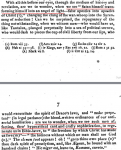
And also on page 7, Fingan mentioned Baptists and Methodists and then would mention that they are “discordant in creed” (i.e. many denominations – does this sound familiar?) of the Episcopals and Presbyterians. He further stated that they were “anxious to preach” to Papists. They thought that they were “Girt” for a “goodly work” of saving Papists with the Gospel. Along with the earlier reference to the “war-whoop”, he would note that the “goddess of Biblicism sounds the trumpet of war!” Finngan would surely feel that these Biblicists were dangerous because they were attempting to preach to the Catholics.
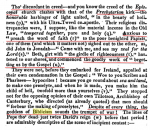
At this point, we are still left wondering what, exactly, the “Biblicism” is that Finngan is describing. Let us look now at page 117. Finngan makes a plea there to the Protestants to “desert that church as not worth remaining in” because it “makes no provision for the sacred unity of faith” Finngan goes on to tell us what these Protestants have traded “the sacred unity of faith” for. He says that “every Protestant is bound to believe” the following statement: “proved by most certain warrants of Holy Scripture” as stated by the 39 Articles. He follows this by urging again that they “abandon their own Communion so flagrantly destitute of the essentials of salvation – Unity of belief.”
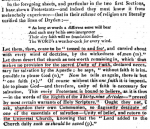
Yes, you have read that correctly. Finngan, a Catholic, is opposed to the Protestant definition of Sola Scriptura. Finngan has apparently coined the English term “Biblicism” in order to write his diatribe against Protestants and their belief that doctrine should only be “proved by most certain warrants of Holy Scripture” as opposed to the “Unity of Faith” and belief in the Catholic Church.
The last citation I will provide from Finngan is from pages 122-123. There Finngan stated that Protestants “should imitate this memorable example of Cornelius; they should not recur to Scripture, but, like him by an angel of God, have reference to Church authority.” As you can see he also mentions the Priesthood in succession to “the Divine Commission to Peter”.
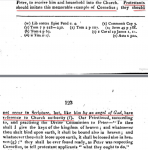
In summary, we have seen that the first usage of “Biblicism” in the English language was indeed a “criticism” (per Dr. Barrett) of Biblicism. More importantly, we have also seen that the “Biblicism” Finngan was critical of was nothing other than what we have come to call Sola Scriptura as defined in the 39 Articles. As we have stated elsewhere, this is yet another example of problems with uncritically resourcing the works of Catholic theologians. Most readers would be unfamiliar with Finngan and would not know that he was Catholic or what he specifically meant by “Biblicism” without digging into the source material. But in this section after Dr. Barrett has written his theses against a quite specific type of “Biblicism”, he notes that Finngan was offering criticism against Biblicism in the earliest English usage of the term.
The logical conclusion is that Dr. Barrett and Finngan have in mind the same definition of Biblicism.
I would like to give Dr. Barrett the benefit of the doubt – maybe he just did a search to find the first usage and saw that it was critical (it looks like a citation above with the “(19)” at the end of the quote. But as this is an excerpt he placed in his Reformation as Renewal from his forthcoming Systematic Theology, footnote 19 must be from the ST.) I would be remiss not to point out the fact that Dr. Barrett referred to R. Scott Clark’s work on the “Reformation understanding of authority” and then cited Finngan who explicitly called Protestants to come back to Rome and the “Church authority” – it is only slightly ironic at this point.
As Dr. White, myself, and many others have pointed out, Dr. Barrett’s theses against “Biblicism” do not apply to the Reformed Biblicism we have been discussing. This Biblicism which Dr. Barrett is critical of, according to Finngan, is nothing more than a reliance on Scripture Alone! I would like to believe that any Protestant would be able to proudly wear the badge of “Biblicism” as it was initially defined and offered as a pejorative against Protestants by Finngan – that of having our beliefs “proved by most certain warrants of holy Scripture.”



